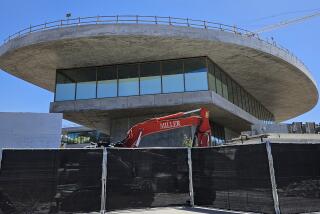From MOCA to Dallas
- Share via
Jeremy Strick, who led Los Angeles’ Museum of Contemporary Art during a nine-year period of vibrant programming and critical acclaim but resigned in December amid a financial crisis that threatened the institution’s survival, has been appointed director of the Nasher Sculpture Center in Dallas.
In his new position, beginning March 2, he will take charge of a much younger and smaller institution -- a 5-year-old exhibition and education center for modern and contemporary sculpture founded by the late Raymond and Patsy Nasher -- but one with a generous endowment and lofty aspirations. Strick, 53, will succeed Steven A. Nash, who left about two years ago to take charge of the Palm Springs Art Museum.
“There is no lack of ambition at the Nasher,” Strick said by phone Friday. “And there’s a real desire to be substantive. It’s a serious group that wants to make an impact on the field and is ready to take the institution to another level. The commitment to quality is evident in the collection, the building and the gardens. Now it’s in a position to add to the collection, develop an ambitious program and think about the position of sculpture in modern and contemporary art.”
Recruiting him
David J. Haemisegger, president of the center’s board of trustees, who began talking to Strick about making the move last spring, called him “a great fit and a great catalyst for lots of wonderful things at the Nasher. Not many museums are committed to sculpture. One of the things we are trying to figure out with Jeremy is what we have and how we can liaison with museums throughout the world in an international dialogue. We think he is the one who can help us do that. He has a scholarly approach to things, he has done great exhibitions and he understands our collection.”
Haemisegger also said he was fully aware of MOCA’s problems and had “no reservations” and “no apprehensions” about Strick’s qualifications. “Museums are a combination. It’s the director, the staff, the board, the mission and the finances. It’s all that coming together. With Jeremy, the chemistry was almost automatic.”
At MOCA, Strick directed a high-profile museum of postwar art, widely regarded as the best of its kind in the country, if not the world. With two downtown showcases, a satellite at the Pacific Design Center, a distinguished collection and a reputation for working closely with artists, the 30-year-old museum has an exhibition program that attracts international attention. But MOCA is chronically unfunded. Last year its endowment plunged to about $6 million, and its economic outlook was so dire that its leaders considered selling part of the collection and merging with the Los Angeles County Museum of Art.
In late December, when Strick’s resignation was announced, MOCA’s board of trustees accepted a $30-million bailout from philanthropist Eli Broad, rounded up $20 million in promised gifts from the trustees and embarked on a restructure of its management. Charles E. Young, chancellor emeritus of UCLA, was enlisted as a short-term chief executive to help stabilize the museum before recruiting a director.
In Dallas, Strick will oversee a more tightly focused enterprise with an endowment that’s expected to reach about $100 million when the founders’ estate is settled.
Couple’s dream
The Nasher is the fulfillment of a dream of a Dallas couple who built one of the world’s finest collections of modern and contemporary sculpture, including major works by Constantin Brancusi, Alexander Calder, Alberto Giacometti, Richard Serra and James Turrell. The facility opened in 2003 in a 55,000-square-foot building on a 2.4-acre site adjacent to the Dallas Museum of Art in the center of the city’s arts district. Renzo Piano designed the building and collaborated with landscape architect Peter Walker on plans for the 1.4-acre sculpture garden.
Dedicated to “advancing the understanding and appreciation of modern and contemporary sculpture through its collection, exhibition, conservation and education programs,” the Nasher presents rotating exhibitions drawn from its holdings and temporary shows of works from other museums and private collections.
--
More to Read
The biggest entertainment stories
Get our big stories about Hollywood, film, television, music, arts, culture and more right in your inbox as soon as they publish.
You may occasionally receive promotional content from the Los Angeles Times.










